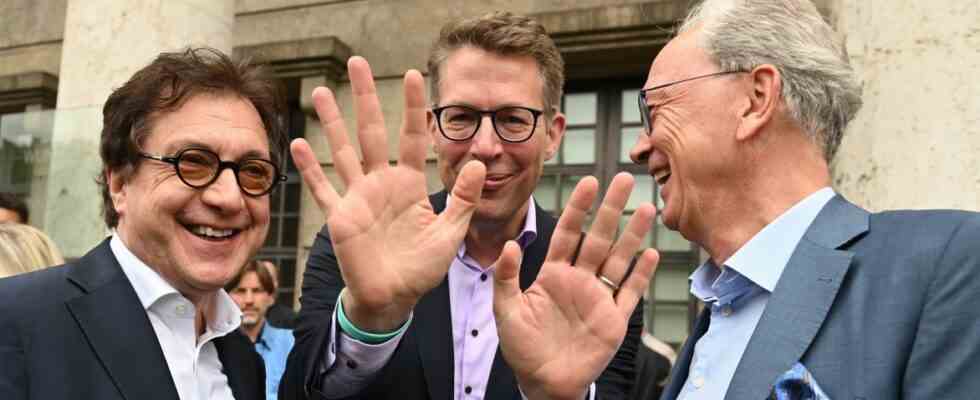They are just walking through the mists of the Japanese artist Fujiko Nakaya on a short tour of the house. The two are already standing in the middle of the turmoil on the terrace: the Prime Minister and his Minister for Art have invited guests to the “Cultural Summer Lounge” in the Haus der Kunst for the first time. An attempt to make good weather for the wounded cultural scene (keywords: brothel comparison and permanent lockdown). And, what can I say: It didn’t rain. No, no empty promises either.
“One thing I don’t really want anymore: to lock up! That shouldn’t happen anymore,” Markus Söder calls quite credibly in his speech to all the state directors, museum directors, filmmakers, poets, pop singers and other more or less freelance artists. Actually. This is the reinsurance for all eventualities. “We wouldn’t have gotten through it without you. And we know that many artists, especially young artists, were suddenly left with nothing at the beginning of the pandemic,” says the Prime Minister. According to the latest estimates, 130,000 lives were saved in Bavaria as a result of the corona measures. The closing of the cultural institutions contributed to this. The extended restart package for art should now help in turn.
Poet Albert Ostermaier embraces director Hans Steinbichler, as the literary lady Rachel Salamander sees, alongside Nuremberg’s mayor Julia Lehner (in white).
(Photo: Stephan Rumpf)
“Perhaps the impression was created that he cares more about football or gastronomy,” says Söder about himself. “That’s not the case.” And a few sentences later, with a wink, he doesn’t resist a football comparison. It is regrettable that the whole world has so far only been convinced of Bavaria’s excellence by a certain association – and not by the wonderful quality of its art treasures. Not yet.
“The independent scene belongs to the Free State like salt on a pretzel.”
Markus Blume, whom Söder elected Minister of Arts and Science in his recent cabinet reshuffle, put it bluntly: “The last two and a half years were just crap. Thank you for sticking with us.” In the past there may have been “interfering noises”, especially between the free art scene and politics, but that’s different now. “The independent scene is as much a part of the Free State as salt is on a pretzel,” says Blume. “The independent scene belongs to the Free State, yes, it is the Free State.”
Markus Söder shakes hands with curator Hanna Kriegleder, in the background Andrea Lissoni, head of Haus der Kunst, is enjoying the evening. Far left: Curator Hans Wiesner.
(Photo: Stephan Rumpf)
Persistent problems are also addressed. Söder speaks of the “enormous restructuring burden” that hit the Free State: he names the National Theater – “with maybe a billion” – and the Residenztheater in Munich as examples. Naturally, new projects like the Konzerthaus would have a hard time of it. Nevertheless, he complains that the eternal “main competitor Berlin” keeps outstripping the state capital. Last but not least, those responsible for politics in the city of Munich are to blame for this. See his initiative to strengthen the Munich Film Festival financially. For this he only experienced “an insult”. As a reminder, the then cultural advisor to the city of Munich, Georg Küppers, said, addressed to Söder, that one should “not just think big”, one should “think at all”.
Anton Biebl, the current cultural advisor to the city of Munich, is one of the many guests on the terrace. He says he can take a little broadside from Söder. On the one hand, the mood is too relaxed on this warm evening to worry about yesterday’s snow. On the other hand, the topics that are really talked about are too interesting: There are the questions of whether the audience will freeze in winter in the National Theater, on Gärtnerplatz or in the Residenztheater? Whether the state is to be understood today “rather as a patron” (Söder) than as a client as in the past? – After all, he no longer orders a specific service from his artists. And does Wolfgang Heckl already have the first of the ten million needed with his crowdfunding for the reconstruction of the mine in the Deutsches Museum?
However, the head of the museum, which has just reopened and has finally been partially renovated, does not reveal the latter. But he likes to report a different number: “30,000 visitors came to the Museum Island on the first weekend,” says Heckl with his typical trump card smile. At least Andrea Lissoni can keep up. “100,000 visitors,” says the director of the Haus der Kunst, have already seen the Nakaya exhibition with its fascinating artificial fog. Plus two. Blume and Soder. But of course they were allowed in for free.

